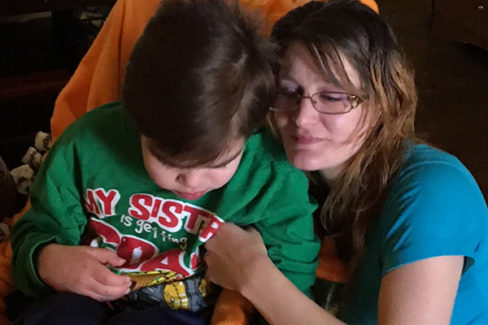Blog
The Devastation of Sanfilippo Syndrome

Shelly was a guest speaker at this year’s Comedy Night fundraiser. She shared with us that she is literally a million dollars in debt due to Ian’s illness. One example of the staggering medical costs was when Ian needed a new tire for his wheelchair and the cost of it was as much as a tire for a car. As a single parent, it is a struggle for her to pay for the high rent in Denver, but she is able to be five minutes away from Children’s Hospital with a first-floor apartment, so she counts herself lucky. The move has been especially difficult for 8-year-old Tesla, who is shy and has been picked on at school. Caruso Family Charities stepped in and helped this deserving family with payment of several months’ rent and unpaid bills, as well as Tae Kwan Do lessons for Tesla, so she can gain confidence. She loves horses and animals, and wants to be a veterinarian someday.
Thanks to the support of our wonderful donors, this family has been shown that there are truly charitable people in Colorado who are here to help them in their time of great need.
Shelly said, “It isn’t difficult because you love your child and you would do just about anything to see them succeed, to flourish, and to live.”
She has accepted that her son may die and she will need funeral expenses.
Shelly told us, “Caruso Family Charity has helped restore my faith in humanity, to have a breath of fresh air, and to remind me that our future as a family is important. Your generosity will one day help us move on from what this awful disease can do.”
About Sanfilippo syndrome
Sanfilippo syndrome is a progressive disorder, however, the rate at which the children deteriorate varies from one individual to another. The change seen in children with Sanfilippo syndrome occurs most often very gradually, but the disorder tends to have three main stages:
In stage 1, it is noticed that the child starts to lag behind and develops difficult behavior. In stage 2, the child may become extremely active, restless, and often have very difficult behavior. Some children have sleep disturbances. Many like to chew on their hands, clothes, or other accessible items. Language and understanding will gradually become lost. Some children never become toilet trained and those who do will eventually lose the ability. In stage 3, the child will begin to slow down. They have more difficulty when walking or running and fall often, eventually losing the ability to walk altogether.
The current life expectancy for children with Sanfilippo syndrome is 14 to 20 years. However, parents remain hopeful in that researchers are actively working on a cure to save the lives of children with this disease. At the present time, there is no cure for Sanfilippo syndrome. Enzyme replacement therapy and gene therapy are the two treatments that researchers have been focusing on to eventually cure Sanfilippo syndrome and other MPS diseases. There are a number of research institutions around the world working on finding a cure for MPS diseases.










